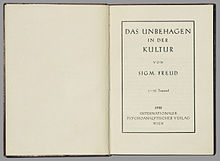Civilization and its Discontents

1930s front cover German edition
|
|
| Author | Sigmund Freud |
|---|---|
| Original title | Das Unbehagen in der Kultur |
| Country | Austria |
| Language | German |
| Subject | Political philosophy |
| Publisher | Internationaler Psychoanalytischer Verlag Wien |
|
Publication date
|
1930 |
| Media type | |
| Pages | 127 |
| ISBN | |
| Preceded by | The Future of an Illusion |
| Followed by | Moses and Monotheism |
Civilization and Its Discontents is a book by Sigmund Freud. Written in 1929, and first published in German in 1930 as Das Unbehagen in der Kultur ("The Uneasiness in Civilization"). It is considered one of Freud's most important and widely read works, and one of the most influential and studied books in the field of modern psychology.
In this seminal book, Sigmund Freud enumerates what he sees as the fundamental tensions between civilization and the individual. The primary friction, he asserts, stems from the individual's quest for instinctive freedom and civilization's contrary demand for conformity and repression of instincts. Freud states that when any situation that is desired by the pleasure principle is prolonged, it creates a feeling of mild contentment. Many of humankind's primitive instincts (for example, the desire to kill and the insatiable craving for sexual gratification) are clearly harmful to the well-being of a human community. As a result, civilization creates laws that prohibit killing, rape, and adultery, and it implements severe punishments if these rules are broken. Thus our possibilities for happiness are restricted by the law. This process, argues Freud, is an inherent quality of civilization that gives rise to perpetual feelings of discontent among its citizens.
Freud's theory is based on the notion that humans have certain characteristic instincts that are immutable. Most notably, the desires for sex, and the predisposition to violent aggression towards authority figures and sexual competitors, who obstruct individual's path to gratification.
Freud begins this work by taking up a possible source of religious feeling that his previous book, The Future of an Illusion, overlooked: the "oceanic feeling" of wholeness, limitlessness, and eternity. Freud himself cannot experience this feeling of dissolution, but notes there exist different pathological and healthy states (e.g. love) where the boundary between ego and object is lost, blurred, or distorted. Freud categorizes the oceanic feeling as being a regression into an earlier state of consciousness — before the ego had differentiated itself from the world of objects. The need for this religious feeling, he writes, arises out of "the infant's helplessness and the longing for the father," as there is no greater infantile need than a father's protection. Freud "imagine[s] that the oceanic feeling became connected with religion later on" in cultural practices.
...
Wikipedia
